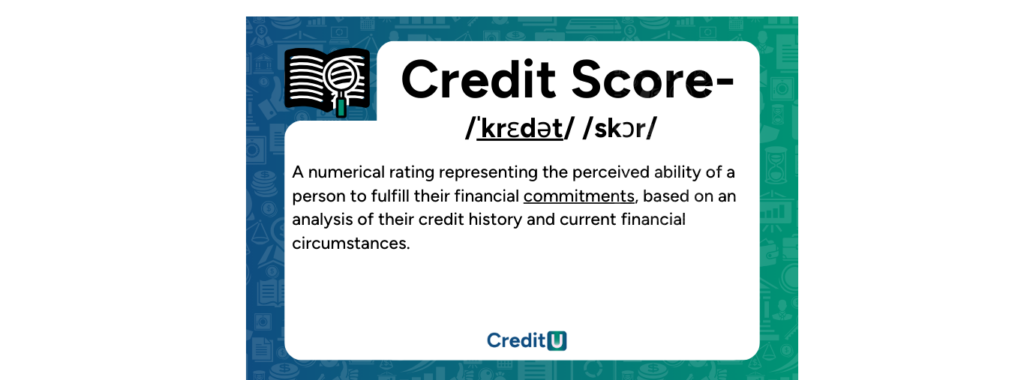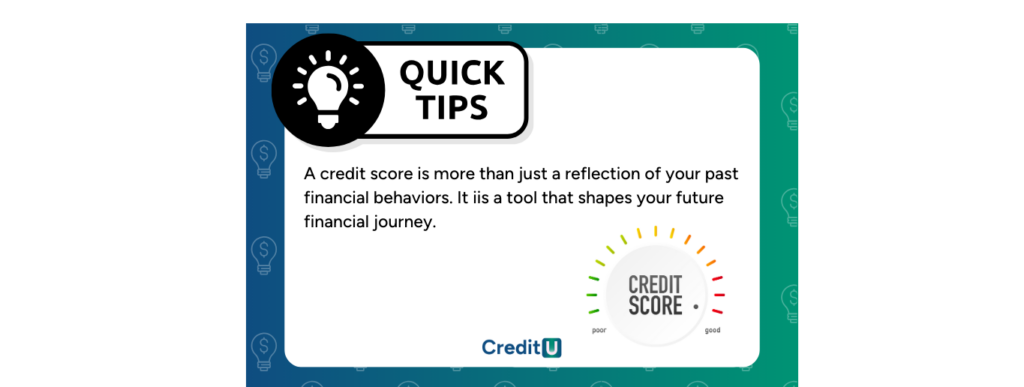Credit Scores 101
April 25, 2023
Credit scores are an essential aspect of personal finance that affects many aspects of your financial life. Your credit score is a number that indicates your creditworthiness and how likely you are to pay back any debt. The score ranges from 300 to 850, and a higher score indicates better creditworthiness. Credit scores are crucial for financial institutions and lenders to assess your creditworthiness before lending you money or extending credit. In this blog post, we will discuss why credit scores are important and how they impact your financial life.
When it comes to personal finances, few things carry as much weight and significance as your credit score. But why? What makes this three-digit number so crucial? In this article, we will look deep into the importance of credit scores, their impact on various aspects of your life, and why you should always aim to maintain a good score.
Topics Covered: What is a Credit Score Factors Affecting Your Credit Score What is a Good Credit Score? Who Reports Your Credit Score? Benefits of a Good Credit Score Consequences of a Poor Credit Score Tips to Improve Your Credit Score What Can CreditU Do For You? Key Insights - Credit Scores 101
What is a Credit Score?

A credit score is a numerical representation of an individual’s creditworthiness. In simpler terms, it’s an indicator of how likely you are to repay borrowed money. Credit scores are derived from your credit history, which includes past borrowings, repayments, late payments, and other related factors.
- Numerical Summary: At its core, a credit score is a numerical value, typically ranging between 300 and 850. This number serves as a condensed version of your entire credit history, providing lenders with an instant perspective on your financial behaviors.
- Reflection of Creditworthiness: Beyond the digits, the score is an evaluative tool that gauges your creditworthiness. In essence, it’s a measure of trust, indicating how reliable you might be in repaying borrowed funds. Those with higher scores have historically demonstrated better financial responsibility, making them more appealing to lenders.
Factors Affecting Credit Scores
The score isn’t determined arbitrarily. It’s meticulously calculated based on a myriad of factors present in your credit report. This includes:
- Payment History: The consistency and punctuality of your payments on debts, loans, and bills.
- Debt Levels: How much you owe in relation to your credit limits, also known as credit utilization.
- Credit Length: The age of your oldest credit account, newer accounts, and the average age of all your accounts.
- Types of Credit: The diversity of your credit accounts, such as credit cards, mortgages, student loans, and retail accounts.
- Recent Inquiries: The number of hard inquiries or credit checks made on your account in recent times.
Your credit score isn’t just a number; it has real-world implications. A robust score can unlock lower interest rates, better loan terms, and a smoother experience in many financial scenarios. Conversely, a lower score might mean higher interest rates or even loan rejections.
It’s essential to understand that credit scores are not static. They evolve and change over time based on your financial behaviors. Timely repayments, lower credit utilization, and responsible borrowing can enhance your score over time, while missed payments, high levels of debt, and excessive new credit applications can diminish it.
What is a Good Credit Score?
Navigating the financial world often requires more than just understanding how to save and invest. It also involves recognizing where you stand in the eyes of lenders. One of the primary metrics lenders use to evaluate your financial trustworthiness is your credit score. So, according to the FICO credit rating model, what constitutes a good credit score?
Credit Score Ranges:
300 – 579: Poor
580 – 669: Fair
670 – 739: Good
740 – 799: Very Good
800 – 850: Excellent
It’s worth noting that these ranges might vary slightly depending on the credit bureau and the country’s specific financial standards. The above ranges are generally accepted standards for FICO scores in the U.S.
If you are above a 670 on your credit score you are considered to have a good credit score. This essentially means that you have a favorable impact on your lending capability.

Who Reports Your Credit Score?
Credit scores play a pivotal role in shaping an individual’s borrowing potential. But where do these scores come from, and who reports them? Let’ s look at the different credit bureaus that derive these information.
Credit Reporting Agencies (Credit Bureaus):
These are organizations that collect, maintain, and disseminate credit information on individuals. They primarily gather data on credit activities, such as loan applications, credit card usage, payment history, and other related financial behaviors. The most renowned credit bureaus, in the U.S., include:
-
- Equifax: One of the three major credit bureaus, Equifax has a long-standing history dating back to the 19th century. It serves both consumers and businesses by providing credit reports, analytics, and more.
- Experian: Operating in multiple countries, Experian offers a plethora of services ranging from credit reporting to fraud prevention.
- TransUnion: This agency provides credit information and management services to approximately one billion people in over 30 countries.
Why Multiple Bureaus?
Different creditors might report to different bureaus, and not all of them necessarily report to all three. This can lead to slight variations in your credit scores across bureaus. It’s one reason why consumers are encouraged to check their reports from all major bureaus to ensure accuracy.
FICO & VantageScore:
While credit bureaus are responsible for gathering and maintaining credit information, when it comes to credit score models, two primary entities dominate the scene:
FICO (Fair Isaac Corporation): Founded in 1956, FICO is the pioneer in credit scoring. Most lenders in the U.S. use FICO scores when making lending decisions.
VantageScore: Developed as a collaborative effort between the three major credit bureaus, VantageScore emerged as a competitor to FICO, providing an alternative model for scoring credit.
Who Accesses These Scores?
Besides individual consumers, a myriad of entities may request access to your credit score, often with your permission. These include:
- Lenders: To evaluate loan or credit card applications.
- Landlords: To assess your reliability as a tenant.
- Employers: Certain industries or positions might review credit scores as part of background checks.
- Insurance Companies: Some insurers use credit scores to determine premiums or insurability.
- Utility Providers: To decide on deposit requirements or payment terms.
Your Right to Know:
Regulations, such as the Fair Credit Reporting Act (FCRA) in the U.S., ensure that consumers have the right to access their credit report (for free, once a year) from each of the major credit bureaus. This allows individuals to monitor their credit and correct any inaccuracies.
While the concept of a credit score might seem straightforward, an intricate system operates behind the scenes. Understanding who reports, calculates, and accesses these scores helps consumers navigate their financial journeys with informed confidence.
Benefits Of a Good Credit Score
Having a good credit score is a major strength for your long- and short-term financial decisions. This is essentially a reflection of how responsible you are with your money. This is also the one thing that tells your creditors about your financial agility. So, let’s dive deep into what benefits you can yield from having a good credit score.
Competitive Interest Rates:
One of the most tangible advantages of possessing a high credit score is the potential for reduced interest rates. Lenders view individuals with strong credit scores as less likely to default on loans. In essence, your solid score serves as evidence of your financial responsibility and discipline. As a result, banks and other financial institutions may offer you lower interest rates on everything from personal loans to mortgages and credit cards. Over the span of a loan, this can translate to substantial savings, making your financial commitments more manageable.
Increased Loan Approval Rates:
A high credit score typically suggests a history of sound financial decisions and consistent repayment. This track record fosters trust with lenders, making them more inclined to approve your applications for loans or credit cards. Essentially, a stellar credit score smoothens the path to securing the financial resources you might seek, be it for purchasing a home, a car, or handling unexpected expenses.
Enhanced Rental Opportunities:
Beyond the realm of lending, your credit score can also play a pivotal role in your housing journey. Landlords and property management companies often consult potential tenants’ credit scores as a metric of their financial reliability. A strong score can not only bolster your chances of securing a rental property but can also provide leverage in negotiations, potentially reducing upfront costs like deposits or even monthly rents.
Negotiation Power:
A high credit score does more than just open doors. It provides leverage. When discussing terms for a loan or a credit card, a robust score empowers you with a strong bargaining position. You can leverage this position to negotiate more favorable terms, be it reduced interest rates, waived fees, or other beneficial stipulations.
Access to Higher Credit Limits:
Demonstrating responsible borrowing and consistent repayment can earn you more than just a good score. Lenders, seeing your creditworthiness, might offer you increased credit limits on existing accounts or new applications. This expanded credit ceiling not only provides more financial flexibility but can also aid in improving your score further by reducing your credit utilization ratio, given that your spending habits remain consistent.
A high credit score is more than just a financial metric, it’s an asset.
Consequences of a Poor Credit Score
Increased Borrowing Expenses:
A lower credit score typically correlates with heightened risk from the lender’s perspective. To mitigate this risk, lenders may charge higher interest rates to those with lower scores. Over time, these elevated rates can accumulate, leading to higher costs for loans or credit card balances. Whether it’s a mortgage, car loan, or personal loan, you might find yourself paying significantly more in interest over the life of the loan compared to someone with a higher score.
Challenges in Securing Loans:
A lower credit score can hinder the process of applying for loans. Lenders might subject applicants to rigorous checks, demand additional documentation, or even deny applications outright. This scrutiny can prolong the application process and decrease the probability of approval, making it challenging to secure essential financial resources when needed.
Challenges to Rent:
Beyond its impact on borrowing, a below-average credit score can also influence housing opportunities. Landlords, aiming to ensure their tenants can consistently meet rent obligations, often use credit scores as a litmus test of financial stability. A weaker score can lead to rental application rejections, or at the very least, necessitate higher security deposits. In competitive housing markets, this can considerably limit one’s rental options.
Diminished Financial Flexibility:
A lower credit score can have overarching effects on one’s financial freedom. Limited access to higher credit limits, unfavorable loan terms, and restricted access to certain financial products can tether one’s financial potential. It might also lead to reliance on less reputable lending sources, such as payday loans, which often come with exorbitant fees and interest rates.
In essence, a lower credit score can have a negative impact overall on your financial journey.
Tips to Improve Credit Scores
Understand Your Credit Report
Before diving into improvement, it’s crucial to know where you stand. Obtain a free credit report from major credit bureaus and review it thoroughly. Familiarize yourself with all the accounts, their statuses, and any potential red flags.
Always Pay on Time
Your payment history is a significant factor in determining your score. Set up reminders or auto-pay systems to ensure you never miss a deadline. Even a delay of a few days can negatively impact your score.
Manage Your Credit Utilization
Credit utilization is the ratio of your credit card balances to their respective limits. Ideally, aim to keep this ratio below 30%. This demonstrates to lenders that you’re not overly reliant on credit.
Limit Hard Inquiries
Every time you apply for credit, a hard inquiry is made. These can slightly reduce your score and stay on your report for two years. Only apply for credit when absolutely necessary.
Address Outstanding Debts
Start by listing all your debts. Create a strategy to tackle them, whether it’s targeting high-interest rates first (avalanche method) or knocking out smaller debts (snowball method).
Diversify Your Credit Mix
Lenders like to see a mix of credit types, such as credit cards, retail accounts, installment loans, and mortgages. While it’s not advisable to take on debt just for the sake of diversity, having a variety can be beneficial.
Dispute Inaccuracies
Errors on your credit report can drag down your score. If you spot any discrepancies or incorrect information, promptly dispute them with the credit bureau.
Maintain Older Credit Accounts
The length of your credit history contributes to your score. Even if you don’t use a particular credit card, consider keeping it open (provided it doesn’t have high fees) to maintain a longer credit history.
Avoid Excessive New Credit
Opening several credit accounts in a short time frame can signal risk to lenders. It can also reduce the average age of your credit accounts. It’s best to pace your credit applications and not rush into multiple new accounts.
Seek Professional Help
If you feel overwhelmed, consider consulting with a credit counseling agency. These professionals can provide guidance, resources, and strategies tailored to your specific situation.
Improving your credit score is a journey, not a sprint. By implementing these tips and regularly monitoring your progress, you can pave the way to a more robust financial future. Remember, consistency is key, and even small, diligent steps can lead to significant improvements over time.
What Can CreditU Do For You?
The CreditU app can be a valuable tool for managing your finances and improving your credit score. One of the ways that CreditU can help is by providing you with access to your credit report and score. By regularly checking their credit report, you can identify any errors or discrepancies that may be negatively impacting your credit score. Additionally, the app can provide tips and suggestions for ways to improve your score, such as paying bills on time, reducing credit card balances, and limiting new credit applications.
CreditU can also help with credit scores by providing budgeting and tracking expenses features. By setting a budget and tracking expenses, you can avoid overspending and falling behind on bills, which can negatively impact your credit score.
The CreditU app is the perfect solution to manage your finances effectively and enhance your credit score. With a user-friendly interface, the app provides easy access to budgeting and tracking tools, and credit monitoring services. Take advantage of these features to remain financially organized and achieve your financial goals. For more information about CreditU, click here. Don’t forget to download the app today!
Key Insights – Credit Scores 101
1. Credit Scores are the foundation on which your lenders gauge your financial stability
2. Having an above average credit score secures your chances of better borrowing rates, access to financial products and high negotiation power as a borrower.
3. It is crucial to upkeep your credit score via constant monitoring and agility.
4. Make use of the free services to monitor your credit scores through the different credit monitoring agencies.
Last Updated on January 11, 2024 by Dilini Dias Dahanayake







